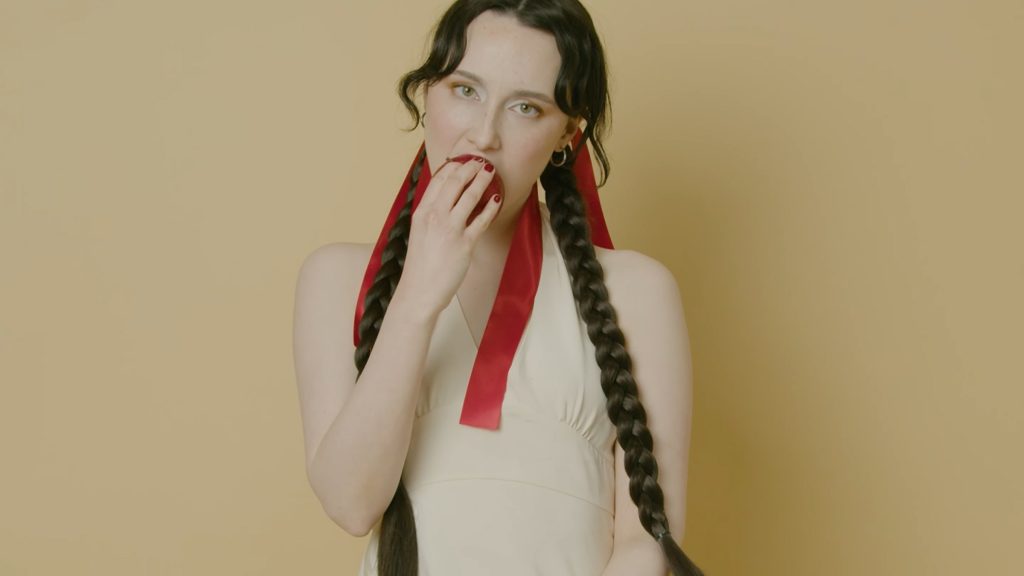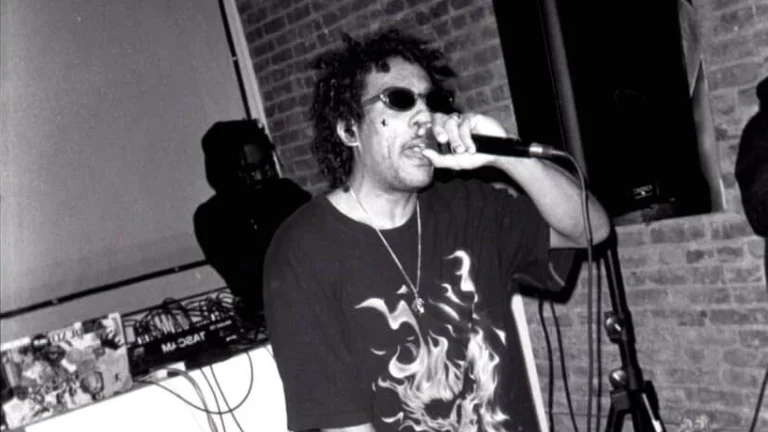Hailing from the vibrant music scene of Brooklyn, Olive Bernard is an exceptional crafter of bedroom-pop tracks that create a unique and captivating auditory experience. Emerging as a notable talent in the indie community, her euphonic work is a heartfelt exploration of themes like identity, authenticity, and emotional healing, offering listeners a raw and honest glimpse into her inner world. With the release of her electric single, “False Front,” Bernard has once again bewitched audiences with her evocative lyrics and distinctive harmonically rich sound.
Bernard began her musical journey under the influence of candid, DIY artists such as Frankie Cosmos, Liz Phair, and Elliott Smith. These early inspirations shaped her initial foray into music, characterized by home-recorded tracks and minimalist production. Over time, Bernard’s sound has evolved into a richer, more eclectic mix, incorporating elements of pop, rock, and synth-driven tracks, thanks to the help of her producer and friend, Drew Schlingman.
Her recent single, “False Front,” delves into the complexities of presenting a false self in relationships, reflecting her academic background in psychoanalysis and sociology. This track is a mesmerizing blend of dreamy synths and a catchy beat, creating an irresistible urge to dance with her. As she prepares to release her new EP, The Box Beneath My Bed, Bernard promises a collection of songs that are not only sonically diverse but also deeply personal and reflective. It showcases her evolution by blending warm, intimate sounds with modern, glossy production. Listeners can expect an eclectic mix of genres and sound palettes, from straightforward pop and rock to sparse acoustic songs and synth-driven tracks. Each song is a journey through the world Bernard creates, offering both emotional depth and musical innovation.
Ahead of The Box Beneath My Bed‘s September release, Every DejaVu sat with Bernard to discuss the intricate themes of identity, emotional vulnerability, and the artistic evolution that have shaped her latest musical endeavor.
Congratulations again on the release of “False Front!” What was the the inspiration behind the single and how does it fit into the broader theme of your upcoming EP?
Thank you! I wrote “False Front” about the early stages of a relationship where it feels too good to be true and you’re waiting for the other shoe to drop. For me, when I wrote this song, that fear was largely rooted in a deep sense of shame—this constant terror of being “found out.” This song was also heavily influenced by the academic work I was doing at the time. I was studying shame in psychoanalysis, sociology, and political history. I wrote this song while reading about D.W. Winnicott’s theory of the true self vs. the false self. The true self (the interior self) is authentic, spontaneous, and unguarded. The false self (the exterior self) is idealized, repressed, and constructed for others’ approval and comfort. I was thinking a lot about how shame leads us— me and the friends I spoke with—to approach relationships as our false selves (false fronts), causing even more shame, fear of abandonment, and isolation. This song is about the anxiety of waiting for your true self to emerge. Themes of avoidance, shame, and fear of abandonment are present in most of the songs on this project. I find that finishing a body of work allows me to move on from certain patterns of thinking, so I’m eager to release this.
With The Box Beneath My Bed on the horizon, what can listeners expect in terms of sound, themes, and overall vibe? Are there any surprises or deviations from your previous work that you’re particularly excited about?
There’s a pretty eclectic mix of sounds, from straight-up pop/rock like “False Front” to sparse acoustic songs that are more reminiscent of songs from my last EP, to some synth-driven tracks. One of the most formative EPs of my adolescence was Sky Ferreira’s Ghost EP. It’s only 5 songs but includes acoustic folk songs, electro-pop, and a more grunge-leaning track. I’ve always found that project very inspiring as someone who loves music in all genres. I appreciate a “cohesive” album when it’s done well—but I think that—often, artists get bogged down by genre constraints and the idea that they have to produce a song in a particular way to maintain continuity. I got super into The 1975 in 2020 (like eight years too late considering I was a huge fan of 1D and the Arctic Monkeys as a middle schooler). I admire how they bounce around genres and production styles from song to song in each album. I would say that overall, this project sounds very warm and intimate, but also glossy and modern. Within that, though, there’s a decent range of genres, sound palettes, and energy levels.
What was the creative process like for The Box Beneath My Bed in comparison to your previous work?
The creative process for this project was so different for this EP than for my last EP, Pretty Easy. I recorded Pretty Easy entirely at my house with a blue snowball mic—except for the drums of “Kitchen Knife,” which were played by my friend’s dad. All the synths were GarageBand sounds that I tweaked until I liked them. I felt so adamant about doing it all myself. This project was produced nearly entirely by my friend and former classmate Drew Schlingman. I brought him demos, and we recorded everything in his apartment with much better mics, analog synths, a better guitarist (Drew), and a drum sampler. A Rhodes piano even makes an appearance! Working with Drew allowed me to achieve sounds I never could have gotten on my own. It was also so fun to bring him gentle songs I’d written on guitar and for him to say, “This is a rock song!” Having two brains involved expanded the scope of possibility in incredible ways.
In “False Front,” you delve into themes of identity and authenticity. Can you discuss the significance of these themes in your music?
I’m a really bad liar—and as a consequence—I find it difficult to write about things that don’t feel one hundred percent true to me. It’s funny because I love music with fictional or fantastical elements. I’ve been working on this recently, experimenting with writing songs that are a bit more poetic, symbolic, and even slightly cryptic. It’s hard to write deeply personal and honest music knowing that the subject may one day hear it. I try not to think about that. My favorite songs are the ones that make me think, “Oh my God, imagine if the person this is about heard this?” The more specific, the more universal.
Throughout The Box Beneath My Bed, you touch on the challenges of emotional healing. Can you discuss how your own experiences with therapy influenced the lyrics and emotions conveyed?
There’s a song on this project called “Therapy Song” about wanting my therapist to like me so badly that I withheld information from her (I don’t recommend it). Strangely, though, therapy has helped me identify recurring themes in my life and inspired the writing of self-reflective and self-critical music.
Are there any specific artists or musicians who have influenced your songwriting style or lyrical themes?
My OG inspiration is Frankie Cosmos. As a high schooler in Brooklyn, I went to her shows every month. They were frequent, usually all ages, and always under $10. She revolutionized what I thought a rock star could be. She writes so much about shame and insecurity, her lyrics are so clever and funny, and she never postures false confidence. She’s the reason I started playing guitar and, thus, writing music. Liz Phair and Courtney Love (Hole), who I also got into in early high school, are also major writing influences for me. Both artists express a kind of unapologetic anger and angst that I aspired to capture in my songwriting as a teenager. They are still a sort of true north for me as a songwriter. Anytime I write something that I feel has a Hole or Liz Phair vibe to it, I know I’ve done something right. Elliott Smith has been my favorite musician since I was a kid. He influences my writing and melodies in subtle ways. I wouldn’t even try to channel him consciously, it would just make me feel inadequate. Elliott and The Velvet Underground are both hugely influential in my approach to production. Stephin Merritt of The Magnetic Fields is another big inspiration for me. “I Don’t Want to Get Over You,” “Andrew in Drag” and
Strange Powers” are songwriting masterpieces, like perfect pop essays where the title is the thesis and the verses are body paragraphs.
Did you face any challenges during the production or recording process of The Box Beneath My Bed?
A song on the upcoming EP called “Phoebe” took us about 20 different attempts to produce correctly. It’s a song about my best friend, Phoebe. It’s a shocker. And, to me, the song feels like a handwritten love letter. We tried so many versions of this song with drums, synths, and different BPMs. I showed it to my dad at every stage of the process, and he would tell me that the production distracted from/ruined the song. Ultimately, we stripped it all back and did just voice, acoustic guitar, and Rhodes piano. That minimal production preserved the delicacy of the song.
As an independent artist, what have been some of the most rewarding aspects of the creative process leading up to this release?
Making music videos has been so much fun. The music videos I’ve made have had microscopic budgets and have come together through the grace of my friends being geniuses and helping me out. The “Born to be Alone” video features all these cakes, fish, and jello that my friend from high school, Ari, made. The “False Front” video was pulled almost entirely from my friend Phoebe’s wardrobe. Organizing all the moving parts for a music video shoot is so chaotic, but seeing it all come together is unbelievably rewarding.
Looking ahead, do you plan to explore similar themes in your future music, or do you have different creative directions in mind?
I’ve been writing lots of music as of late. There’s a lot of thematic overlap. I was thinking about when people criticize Taylor Swift for still writing about the same themes and boyfriends from when she was 19 and it’s like, a person only has so many formative experiences and recurring psychological patterns.
I just wrote a very weird song whose lyrics are much less obvious and linear than other songs I’ve written. I like how songwriters like Charli XCX, Caroline Polachek, Alex G, Aaron Maine (Porches), and even sometimes Elliott Smith use seemingly nonsensical lyrics that create an atmosphere rather than a story. Even if you don’t fully understand what the song is about, you feel present in their lyrical world, be it beautiful or unsettling. There’s something kind of freeing about writing in that way.
Finally, looking beyond this upcoming release, what are your aspirations and goals as an artist for the remainder of the year, and even beyond?
I’m preparing to play live shows again. I’m excited to figure out new live arrangements, and I hope to play outside of NYC again. I want to make a proper album. I want to collaborate with more artists and producers. The Box Beneath My Bed will be out September 6!





